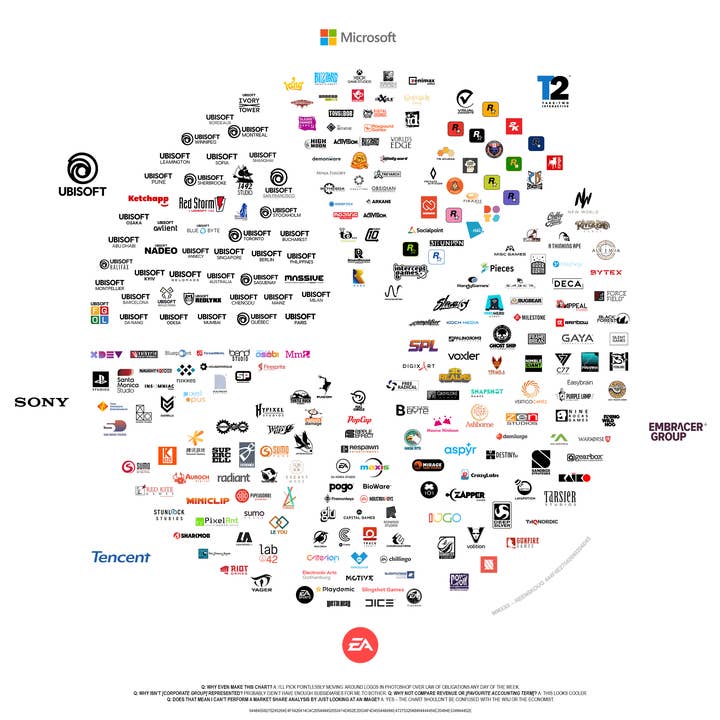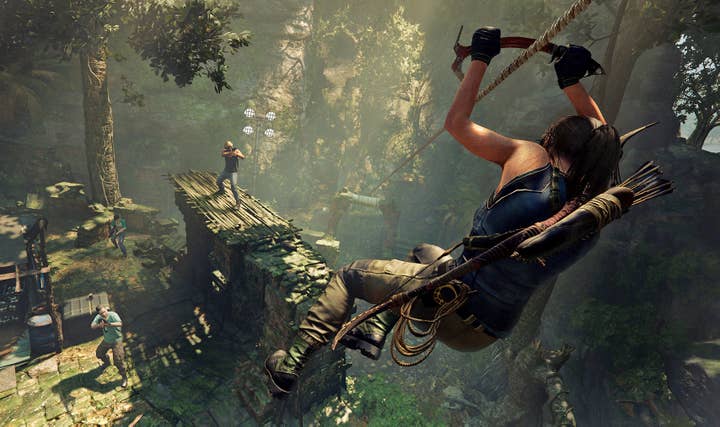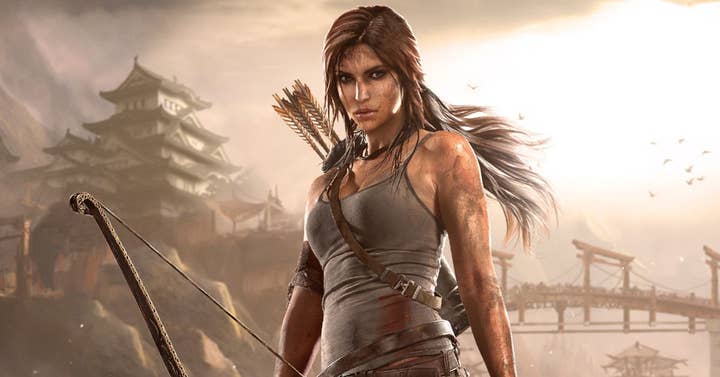Buying Tomb Raider makes Embracer one to watch. Well, keep watching | Opinion
So far, the firm's acquisition spree has built up a healthy catalogue of smaller releases but last week's purchase shows signs of AAA ambition
In wake of the shock news that Square Enix was selling Crystal Dynamics, Eidos Montreal and Square Enix Montreal for $300 million, I saw an interesting infographic on an industry Facebook group.
The image, included below, laid out studio logos in a pie chart designed to compare how many subsidiaries are owned by Microsoft, Sony, Take-Two, Ubisoft, Electronic Arts, Tencent and Embracer Group.
(Slight tangent: The original infographic that sparked this train of thought was from a Seeking Alpha article from February about Ubisoft's struggles and how allowing itself to be acquired might be a way to reverse its misfortunes. Funnily enough, last week we heard more rumours around this.)

It's by no means a scientific graph; there are a couple of notable absences, like the lack of Bungie in Sony's segment. But it's still an interesting glance at the studio landscape among these companies -- and regular GamesIndustry.biz readers with an interest in M&A news will be in no way surprised to know Embracer took up almost a third of the graph (that's not just bigger logos, either. It definitely has more than any other slice. I counted)
That, in itself, is not news. Embracer has been acquiring scores of companies for years. Its ambitions have perhaps been apparent since 2011, when the company (then Nordic Games) purchased JoWooD Entertainment and its subsidiaries. Two years later, it bought various assets and IP from bankrupt publisher THQ and later the brand itself, setting it on the path to become THQ Nordic and then Embracer.
This M&A strategy has escalated into a full blown acquisition spree in the last few years. Back in November, CEO Lars Wingefors said Embacer had acquired 37 companies within the past 12 months and expected to do a similar amount in the next 12 (lo and behold, it acquired board game publisher Asmodee less than a month later, and Dark Horse Comics a couple of weeks after that).
It's easy to forget, in certain regards, Embracer stands shoulder to shoulder with AAA giants like EA and Take-Two
In fact, Embracer has acquired at least four (often a lot more) companies every year since 2017.
The reason I bring all this up is that much of the narrative around last week's news has centered around Square Enix: why it sold valuable IP such as Tomb Raider and Deus Ex (not forgetting personal favourite Thief) for so little, and why it has essentially abandoned Western games development (internally, at least. The firm still retains publishing rights for Just Cause, Life Is Strange and the apparently still unprofitable Outriders).
Our very own Brendan Sinclair explored the implications of this in an excellent piece about how the Embracer deal marks the end of a long-running existential crisis among Japanese publishers, which you should absolutely read.
But personally, I'm also intrigued by what it means for Embracer, with the company (still) gearing up to become a much bigger player in the games space.
In the announcement regarding Crystal Dynamics et al, Square Enix America and Europe CEO Phil Rogers described Embracer as the "best kept secret in gaming" -- and I sort of can see where he's coming from. It's easy to forget, in terms of the number of studios and number of IP owned, Embracer stands shoulder to shoulder with AAA giants like EA and Take-Two. That's partly because very few of its games (so far) compete at the same level.
If you look at the biggest Embracer-owned hits, how much can Embracer be credited? Metro Exodus managed six million sales, although this is the continuation of an ongoing deal between Deep Silver, acquired by Embracer in 2018, and developer 4A Games, acquired in 2020.
SpongeBob SquarePants: Battle For Bikini Bottom Rehydrated sold over two million units, driven largely by nostalgia.
Last year's Biomutant sold one million copies and recouped all its costs in the first week. More impressively, Viking multiplayer outing Valheim -- developed by indie studio Iron Gate and published by Embracer-owned Coffee Stain -- is now past ten million sales.

Embracer can and can't be credited for these; it can't in that Coffee Stain and THQ Nordic were the businesses that secured and handled these deals, and it can in that that's how Embracer works -- as a holding company that allows its subsidiaries to operate independently.
With 124 internal studios, 10,000 developers, and some true AAA hits on the horizon, gaming's 'best-kept secret' doesn't look like it will remain secret for much longer
The fascinating thing is that, to date, the Embracer Group appears to not be the typical hit-driven business that tends to dominate the industry. (In fact, we've previously published a theory on why Embracer -- and other M&A hungry firms -- have made so many purchases in recent years)
Most major publishers aim for bigger and better hits with their newest and most advance games. But many of Embracer's highest profile games so far have been remasters and re-releases of older titles (typically former THQ properties) -- and that's fine. As long as fans are picking up their past favourites (I've been more than happy to repurchase both De Blobs and Red Faction: Guerrilla), there's a steady stream of income that enables Embracer to continue doing what it's doing.
But this Crystal Dynamics purchase, combined with other recent acquisitions, suggests to me that Embracer is shifting strategy somewhat, perhaps endeavouring to behave like the publishing giant it has gradually become.
Tomb Raider is hands down the biggest IP Embracer now owns. Undeniably AAA. This year we'll see the first post-acquisition Saints Row, a series reboot and the first major new entry to the franchise in a post-GTA 5 world. Also a AAA release.
Gearbox is perhaps the biggest studio Embracer has brought into the fold, and with it comes Borderlands. While the series' publishing rights are tied up with publisher 2K Games for the time being, Gearbox boss Randy Pitchford has been very clear that the IP itself is owned by his studio -- another AAA feather in Embracer's increasingly impressive cap.
And that's without the aforementioned Asmodee and the purchase of Dark Horse Comics, suggesting Embracer doesn't only have its sights set on gaming, but the wider world of entertainment in general.
Embracer has made more headline for buying boatloads of studios than it has for selling hit games in recent years. But with this latest acquisition bringing Embracer up to 124 internal studios and over 14,000 employees (including 10,000 developers), and the promise of some true AAA hits on the horizon, gaming's 'best-kept secret' doesn't look like it will remain secret for much longer.

